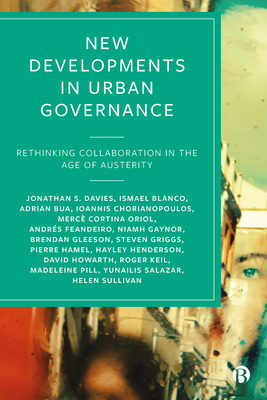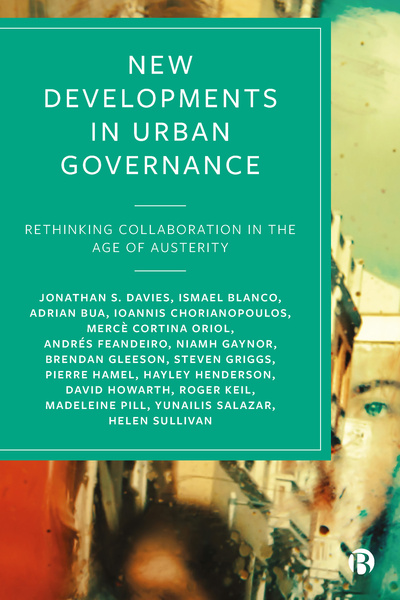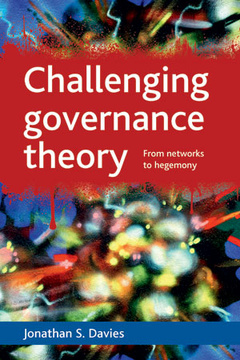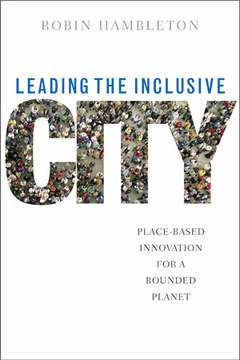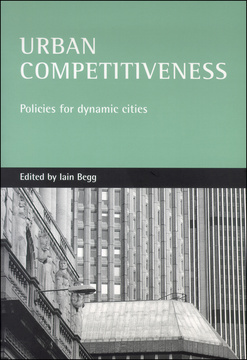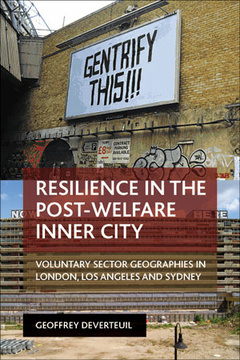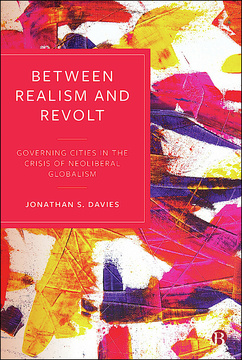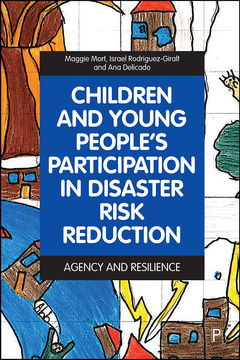New Developments in Urban Governance
Rethinking Collaboration in the Age of Austerity
By Jonathan Davies, Ismael Blanco, Adrian Bua, Ioannis Chorianopoulos, Mercè Cortina-Oriol, Andrés Feandeiro, Niamh Gaynor, Brendan Gleeson, Steven Griggs, Pierre Hamel, Hayley Henderson, David Howarth, Roger Keil, Madeleine Pill, Yunailis Salazar and Helen Sullivan
Published
12 Sep 2023Page count
194 pagesISBN
978-1529205879Dimensions
234 x 156 mmImprint
Bristol University PressPublished
21 Jan 2022Page count
194 pagesISBN
978-1529205824Dimensions
234 x 156 mmImprint
Bristol University PressPublished
21 Jan 2022Page count
194 pagesISBN
978-1529205848Imprint
Bristol University PressPublished
21 Jan 2022Page count
194 pagesISBN
978-1529205848Imprint
Bristol University PressThis book presents the findings of a major Economic and Social Research Council (ESRC) project into urban austerity governance in eight cities across the world (Athens, Baltimore, Barcelona, Melbourne, Dublin, Leicester, Montréal and Nantes). It offers comparative reflections on the myriad experiences of collaborative governance and its limitations.
An international collaborative from across the social sciences, the book discusses ways that citizens, activists and local states collaborate and come into conflict in attempting to build just cities. It examines the development of egalitarian collaborative governance strategies, provides innovative ideas and tools to extend emancipatory governance practices and shows hopeful possibilities for cities beyond austerity and neoliberalism.
“The book provides a critical but also nuanced analysis of how policy agendas, dominated by neoliberal visions and austerity, affect practices of collaborative urban governance. Its comparative approach also shows that governance devices can also be host to resistance strategies and policy alternatives to austerity.” Gilles Pinson, Sciences Po Bordeaux
“This impressive collection of comparative international case studies offers a highly original and intriguing account of how local collaboration can help to circumvent the negative impacts of austerity on global cities.” Sarah Ayres, University of Bristol
“This book provides a unique account of responses to governing, and resisting, austerity. Trends to centralization and authoritarianism are revealed, but alongside glimpses of alternative urban futures. Detailed empirical research is combined with a passion for urban social justice, creating a highly readable resource for academics, activists and urban policymakers.” Vivien Lowndes, University of Birmingham
Jonathan S. Davies is Director of the Centre for Urban Research on Austerity and Professor of Critical Policy Studies at De Montfort University.
Ismael Blanco is Director of the Institute for Governance and Public Policies (IGOP) and Lecturer in the Department of Political Science and Public Law at the Autonomous University of Barcelona.
Adrian Bua is Lecturer in Urban Politics in the Department of Politics, People and Place at De Montfort University and a member of the Centre for Urban Research on Austerity.
Ioannis Chorianopoulos is Professor in Social Geography at the University of the Aegean.
Mercè Cortina Oriol is Senior Lecturer in Public Policy and Urban Politics in the Department of Politics, People and Place at De Montfort University and a member of the Centre for Urban Research on Austerity.
Niamh Gaynor is Associate Professor at Dublin City University.
Brendan Gleeson is Professor of Urban Policy Studies at the University of Melbourne.
Steven Griggs is Director of the Local Governance Research Centre and Professor of Public Policy at De Montfort University.
Pierre Hamel is Professor of Sociology at the Université de Montréal.
Hayley Henderson is Postdoctoral Fellow in the Crawford School of Public Policy at the Australian National University.
David Howarth is Professor of Politics at the University of Essex.
Roger Keil is Professor and York Research Chair in Global Sub/Urban Studies at York University.
Madeleine Pill is Senior Lecturer in the Department of Urban Studies and Planning at the University of Sheffield.
Yunailis Salazar is Researcher in the Institute for Governance and Public Policies (IGOP) at the Autonomous University of Barcelona.
Helen Sullivan is Dean, College of Asia and the Pacific at the Australian National University.
Andrés Feandeiro received his PhD in Governance and Management from De Montfort University. His research interests include urban governance and innovation.
Introduction
Crisis and Austerity in Eight Cities: An Overview
Collaborative Governance after the Global Economic Crisis
Austerity Governance, Political Resistance and Urban Transformation
Rescaling through Austerity Governance
The Local State in Austerity Governance
Urban Cultural Diversity and Economic Migration in Austere Times
Conclusion
Afterword: From Austerity to COVID-19 and Beyond







